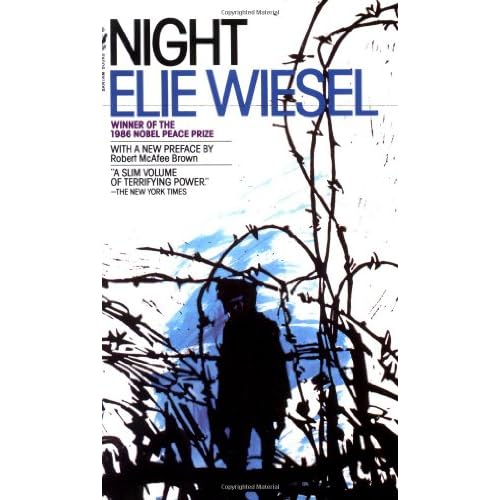-
Night

"Peace is not a gift from God to man, but a gift from man to himself."
--Elie WieselReading Schedule
Expect a reading quiz every day. The dates listed are due dates.
March 25: In class:
Watch If you cried, you died
March 31: Chapters 1 and 2
April 2: Chapter 3 and 4In class: Watch One Survivor RemembersRespond to the video. What did you think? What were some details that stood out to you? What surprised you?April 4: Chapters 5 and 6:Modern Injustice topic due. 1 well-written paragraph detailing your issue.
In class: Watch The Great Rewiring of Childhood: A Smartphone-Social Media Dystopia Resond to the video. What did you think? What stood out to you? Do you agree or disagree? Why? What can you do to remedy the issues brought up in the video?
April 8: Finish the book, Chapters 7, 8, and 9.
In class: Watch Elie Wiesel and Oprah Winfrey at Auschwitz.
Respond to the video. What did you think? What stood out to you? What was said that surprised you? What are your main takeaways from the book, Night?
April 10: Exam. Multiple choice and essay. I will choose ONE of the six essay questions listed below all the links. Study Guide due and Dialectical Journal due. Dialectical Journals must also be submitted to Turnitin.com.April 21/23: Modern Injustices presentations. 3-4 minutes. 3 paragraph mini-essay due. Your essay must be submitted to Turnitin.com.Turnitin.com information:Study Links
Introduction to the Holocaust Video from th National Holocaust Museum (warning of disturbing and graphic images)
Elie Wiesel and Oprah Winfrey at Auschwitz The interview and documentary we will be watching in class.United States Holocaust Museum United States Holocaust Memorial Museum. Great site to learn about the Holocaust. Highly recommended.
Wikipedia, Night Wikipedia article on Night. Follow the links to the various Holocaust cites for more historical context.
Book Notes Be sure to follow the topic tracking links for each chapter.
The Diary of Anne Frank (movie) The 2009 film version.Selected sites from "A Teacher's guide to the Holocaust" (An amazing website).
Maps Very useful maps.
Timelines Holocaust timelines.
People Who were the various groups involved? Great website.
Virtual Reality Virtual tours of over 20 concentration camps and Holocaust memorials.
Essay Questions
- What is the significance of the book’s final image, Wiesel’s face, reflected in a mirror? He writes that a corpse gazed back at him, with a look that has never left him. What aspects of him died during his ordeal? What aspects were born in their place? What do you make of his observation that among the men liberated with him, not one sought revenge?
- When Elie witnesses one of the several public hangings he sees in Buna, he writes, “For God’s sake, where is God?” He asks a prisoner who also sees the hanging. “Where is He?” Elie answers, as though talking only to himself. “This is where—hanging here from this gallows . . .” What does he mean by this? How could God have been hanged? How have Elie’s thoughts and feelings changed since he identified with Job while in Auschwitz. Discuss the relationship that Wiesel has with God throughout Night.
- What does the word Night symbolize for Wiesel? Why do you think he entitled his book Night? How does he describe the nighttime, and how does it compare to “day”? Look carefully at all the ways/places in the text that this word is used, and decide what you think the most important meaning of this word/symbol is.
- Compare and contrast Elie’s attitude towards God and religion at the beginning of the story and at the end. Use specific examples to explain what causes the changes and when the changes occur.
- Chronicle and analyze Elie’s dehumanization. How does he lose his sense of self through his suffering and despair?
- How do the people Wiesel interacts with strengthen or diminish his hope and desire to live? Talk about his father, Madame Schachter, Juliek (the violin player), the French girl, Rabbi Eliahou and his son, the Nazis.

